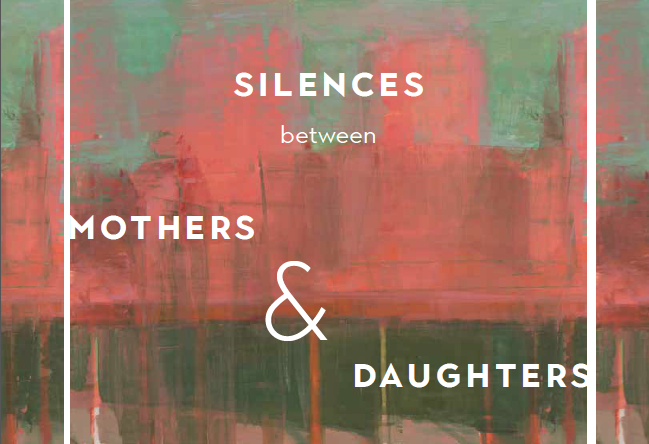
Silences Between Mothers & Daughters
WHEN MY MOTHER had her first episode of congestive heart failure, I was 46. The doctors prescribed various medicines and told her to exercise, and after a few days in the hospital the crisis seemed to be over. She took up swimming, which she didn’t like, and lived another 12 years.
I never knew how my mother felt about this experience, even though I was there with her through it all. It was some-thing to be handled, not discussed, and she seemed to adjust to her new condition without difficulty. I wonder now about the fear and anxiety she must have felt, and what it was like to be a divorced, aging woman, facing the prospect of living alone with a diseased heart. I wish I knew. But she was of a generation that didn’t talk directly about these things, and she was more interested in controlling her feelings than exploring them.
Still, I could have asked more questions. I could have gone beyond her proper, contained surface and encouraged her to open up. Having worked over a dozen years as a psychotherapist, I had the skill to do this, but I didn’t take the time. I told myself I was too busy. I had just moved to the West Coast, a half hour from her, and was transitioning into a new marriage and a new career as a publisher. My schedule was crowded with things to do and people to meet, and I was in a speeded-up state.
I settled into the role of the dutiful daughter, watching over my mother from a distance, making sure she had what she needed. Every so often I took her out for lunch or dropped by, and we spoke about family matters and the trips she sometimes took. I didn’t talk much about myself. Bruised by her rejection in the past, I was careful not to reveal any-thing about the disturbing issues I was facing in my new life.
Now that I am the age my mother was when she first became ill, I realize she must have sensed my emotional unavailability and known she couldn’t share intimate parts of herself with me. There was no space in our conversations for her sorrows and insecurities or her worries about the future, and in return, I didn’t seek her advice or solicit her wisdom. Perhaps she could see in my face that I was having difficulties, but we continued as though this wasn’t happening. Did words sometimes well up within her and get stuck in her throat, as they did for me?
I’m sorry my mother and I couldn’t speak openly during that time. We could have been of solace to each other. I look back at my middle-aged self and see how much I’ve learned since then about the importance of connection. With two middle-aged daughters of my own, I now know how it feels to be in my mother’s position. My relationships with them are more satisfying than ours had been and we speak with much more candor, but I too have experienced awkward silences and censored topics, wanting to say something but holding back, fearing that I’ll disrupt our connection or cause offense or somehow knock us off course. I’ve learned that it is some-times easier to listen to what they have to say than to reveal my thoughts or feelings. But there’s a price I pay when I hide in this way: I’m less known by them.
It took me a long time to realize that I silence myself with my daughters, but I’ve discovered I’m not unique in this way. My colleague Sandra Butler and I recently wrote a book about older mothers mothering middle-aged daughters, and in the process, we spoke in depth with dozens of women aged 65–85. To my surprise, most of them said they often feel unknown or unseen by their daughters.
They tell us about the reasons why this happens. Some fear their daughters’ anger, disapproval, or withdrawal, and say they are “walking on eggshells.” Others carefully circumvent the past so that old wounds are not reopened, or they’re ashamed of the mistakes they’ve made. We spoke with mothers who minimize their own success and accomplishments, fearing they might intimidate or overshadow daughters who are having difficulties, while others silence themselves because their daughters aren’t particularly interested in them, relating to them only as “Mom” or “Grandma.” And there are those who remain silent because they’re afraid of being seen as bossy and judgmental.
Mother-daughter relationships can be deeply satisfying and fulfilling, but often they are troubled because of the existence of their shared history. It’s hard for a daughter to ignore her mother’s pursed lips in the present moment when this reminds her of how her mother looked before punishing her as a child, and it’s hard for a mother to accept her daughter canceling a dinner together when it reminds her of the pain she felt when her offspring chose to live with their father and not with her after the divorce.
Mothers and daughters are deeply connected by a complex history. It’s assumed or at least hoped they will be able to talk to each other in an intimate way. It is all the more disturbing when they don’t.
Mothers often look back fondly to when their daughters were young and they felt they had fewer constraints on speech. As one told us, “I could say whatever I wanted in those days because I was her mother and she was dependent on me. I taught her Jewish values and the importance of family life, but unfortunately that didn’t stick. She hardly ever sees her relatives and doesn’t ask about them, and she works for a company that exploits its workers. I love her—I always will—and there’s a bond between us, but I have to be so much more careful about what I say to her now. Otherwise, I’m afraid I’ll lose her.”
At the heart of mothers’ concern is the fear of loss. As their lives begin to contract and their daughters move fully into their own with partners, children, careers, and community involvements, mothers sometimes feel left behind. This happens at a time when they’re more vulnerable, adjusting to the demands of their aging bodies and their changing circumstances. Contact with their daughters becomes increasingly precious and infused with meaning, and it matters more to them because they understand in a way they didn’t before that it won’t last forever. They don’t want to lose this most-important connection because of saying the wrong thing.
I’ve focused on mothers silencing themselves since it’s most familiar to me. But mothers are just half of a relation-ship’s equation, as I learned when my own fell ill, and daughters have a multitude of reasons for being silent. I, for one, carried a lot of resentment and distrust from the past, and that made me hold back on revealing myself to my mother.
Failure in communication is not inevitable because of shared history, however. Some relationships grow deeper as mothers reach the last decades of their lives and look within themselves and acknowledge their mistakes. No one is perfect, and when they are able to see the missteps they made through the years and apologize to their daughters, the door to forgiveness is opened. And then silence—the kind that feels like hiding or negating the self or avoiding saying the hard things—is no longer an issue.
I know about this because of talking with so many mothers, and I also experienced it myself. My mother softened as she aged and approached death, and began to express words of regrets. Once she told me she was sorry she hadn’t been a better mother, and another time said she knew mine had been a hard childhood. I didn’t need her to spell out the details. Her intention was enough; I began to trust her more and my love deepened, and I was able to apologize to her, too. And in so doing, I let go of being the stubborn, silent daughter I had been for years and forgave her and myself for all that had gone before. With that, we moved into a state of closeness we had never known.
Nan Fink Gefen is the publisher of Persimmon Tree: An Online Magazine of the Arts by Women over Sixty. Her most recent book is It Never Ends: Mothering Middle-Aged Daughters (She Writes Press, 2017) .



